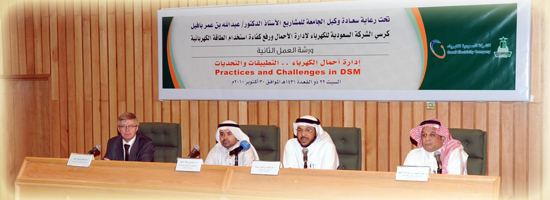KAU Considers Initiation of DSM Programme
|
|

|
|
A workshop under the title of "Practices and Challenges in DSM" was organized by the KAU-based Saudi Electricity Company's Chair for Demand Side Management and Energy Efficiency on Saturday, 30th October, at King Faisal Conference Center.
The event was held under the patronage of Prof Abdullah Bafil, KAU Vice President for Projects.
In his lecture, Hans Nilsson, Chairman of the IEA DSM-Programme and founder and Board Chairman of the European Council for an Energy Efficient Economy (ECEEE), stressed that the implementation of the demand side management and energy efficiency programme in European countries had reduced the overall power consumption by 49%.
According to him, the initiation of the programme in Sweden has reduced the gross final energy consumption by 3-5%, compared to 11% in Ireland.
He also added that the introduction of smart meters had resulted in 4-10% cut in the overall electricity consumption.
Dr Ibrahim M. Jomoah, the Chair Supervisor, said that the Chair was considering the implementation of the programme in Saudi Arabia, bearing in mind the difference in climate and consumers' attitude there.
Dr Ramzy R. Obaid, of the Department of Electrical and Computer Engineering, Faculty of Engineering, pointed out that peak loads in Saudi Arabia had reached 30 GW in 2005—30 times their 1975 level, and 44 GW in 2009—10 times their 2000 level.
He also attributed the soaring demand for electricity in Saudi Arabia to the increase in population, religious seasons, expansion in the full electrification programme and the high levels of temperatures due to the Kingdom's geographic location.
He also added that there had been a marked change in the consumers' attitude over the years, pointing out that the average consumption of a household consisting of 5 medium-sized rooms was about 1200 Watt for lighting and 60.000 BTU for cooling in 1980, as against 8000 Watt for lighting and 150.000 BTU for cooling over the same period in 2009.
He also appealed to consumers to use electricity sparingly and efficiently so as to cut the rising levels of temperature.
|
|